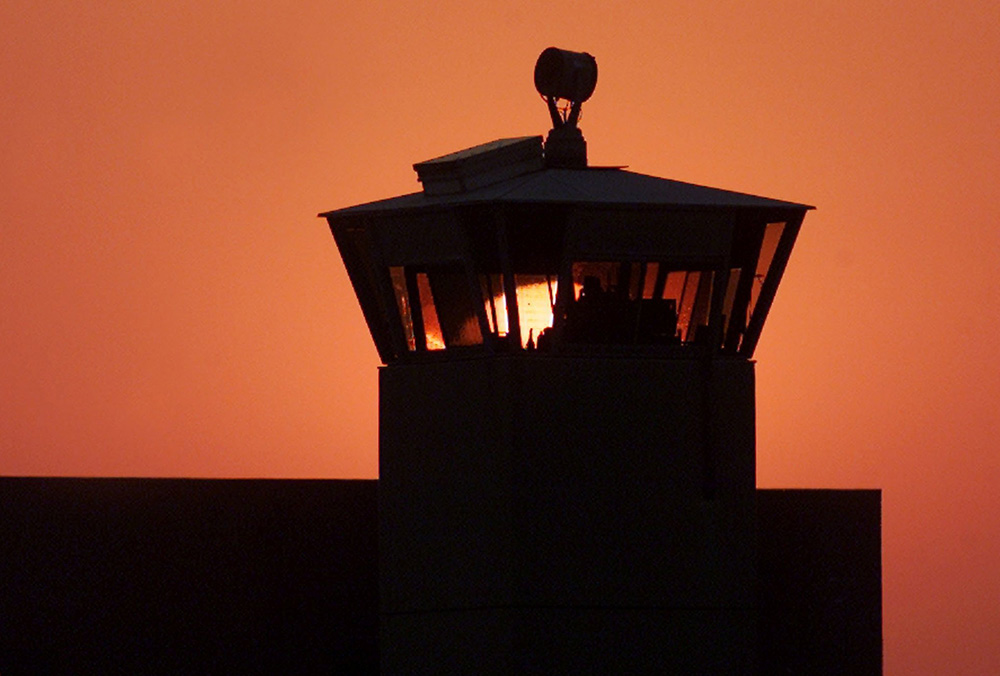
The sun sets behind one of the guard towers in a 2001 file photo at the Federal Correctional Complex in Terre Haute, Indiana, the site where the federal death penalty is carried out. (CNS/Reuters/Andy Clark)
With three more federal executions scheduled before Joe Biden's inauguration on Jan. 20, Conservatives Concerned About the Death Penalty has joined calls to end the spree of federal executions taking place during the final months of Donald Trump's presidency.
The organization, a project of Equal Justice USA, has signed onto a letter urging Congress to pass legislation to end the federal death penalty, and to oppose the scheduled executions, though the ultimate power to stop them rests with Trump. The group has also worked with Catholic organizations, including the Diocese of Cheyenne, Wyoming.
2020 was the first year in American history during which the federal government has executed more individuals than all the states combined, the Death Penalty Information Center said in its annual report, released Dec. 16. The report refers to the last six months of 2020 as "a six-month spree of federal executions without parallel in the 20th or 21st centuries."
Despite widespread opposition to the executions, Hannah Cox, the senior national manager of Conservatives Concerned, told NCR she does not expect Trump to change course. "He acts emotionally," she said, and he has a history of publicly backing the death penalty. After the 1989 attack for which the Central Park Five were wrongfully convicted, he took out newspaper advertisements calling for New York to reinstate the death penalty.
Biden will be the first president to oppose capital punishment upon entering office, Cox noted. But three people are still set to be executed by the federal government before that happens. The first, Lisa Montgomery, was scheduled to be put to death on Jan. 12 but her execution was stayed by federal Judge Patrick Hanlon, who ordered a hearing into Montgomery's mental competence. * Catholic advocates, including St. Joseph Sr. Helen Prejean, have urged clemency for Montgomery, who suffered years of sexual abuse as a child before she murdered 23-year-old Bobbie Jo Stinnett in Missouri in 2004.
The second, Corey Johnson, is scheduled to be executed two days later on Jan. 14.
The third, Maryland native Dustin Higgs, is set to be executed the day after Johnson, on Jan. 15. Eight Catholic bishops in the Maryland Catholic Conference, including Cardinal Wilton Gregory, have called to stop Higgs' execution.
Johnson and Higgs are both Black men; Montgomery is white. As Jesuit Fr. James Keenan and capital defense attorney William Montross Jr. pointed out in a Dec. 11 column for NCR, five of the six people the federal government has executed or plans to execute during the final lame-duck session of Trump's presidency have been Black men.
"Study after study demonstrates that the death penalty is infected with racial bias; the federal death penalty is no different," they wrote.
Advertisement
The Virginia Interfaith Center for Public Policy, which also signed the letter to Congress and will support a bill to abolish the death penalty in Virginia this year, hosted an online press conference Jan. 7 in which five Black faith leaders from Virginia addressed the historic and ongoing racial imbalance in the death penalty's application in the state.
Over time, research has shown that the state's use of the death penalty has supplanted lynching, said the Rev. LaKeisha Cook, a Baptist minister who joined the Virginia Interfaith Center as its justice reform organizer in September. "We do recognize that it is now no longer lynching the way that we knew in history, but it is still something that has a great impact disproportionately on the African American community, and that is shown in the fact that our death row currently here in the commonwealth is 100% Black," Cook said.
Like the Virginia Interfaith Center, Conservatives Concerned focuses primarily on state-level death penalty repeal. The group, which calls itself "a network of political and social conservatives who question the alignment of capital punishment with conservative principles and values," has chapters in 13 states. Its newest chapter, in Wyoming, was inaugurated last January.
The main strategy of Conservatives Concerned is to inform the public about the risks, flaws, and social and economic costs of the death penalty, said Cox. "Politics flows downstream from culture, so our goal is to go into the grassroots work of education," she said.
One of the group's key anti-death-penalty arguments is fiscal. "The death penalty costs millions more dollars than a system of life without parole – before a single appeal is even filed," says the organization's website on its "Why We're Concerned" page.
In Wyoming, the Cheyenne Diocese, which encompasses the entire state, has partnered with Conservatives Concerned to promote its advocacy work. When the Wyoming chapter launched, the diocese helped with the launch announcement.
"Wyoming is a conservative state," said Deacon Mike Leman, the diocese's legislative liaison. "How do we go from that [conservative] standpoint to trusting the government to kill people?" Leman asked in an interview with NCR.
"The government makes a lot of mistakes, and this is one you can't go back on," Leman said.
Leman also echoed the fiscally conservative argument against the death penalty. In light of Wyoming's financial struggles, it doesn't make sense to pay three quarters of a million dollars annually to keep the system in place, he said.
"A lot of conservatives care about [the issue] because of the fiscal impact," Leman said. "As a representative of the Catholic Church, I wish it were the moral argument that were winning people over, but unfortunately it's often the fiscal thing." The "brutal reality" of the death penalty does not always enter the conversation, Leman said.
Through its work alongside Conservatives Concerned, the Cheyenne Diocese is trying to support the U.S. Conference of Catholic Bishops' message that federal executions should stop, Leman said. "When we take the life of someone who can't run away and it's not self-defense, we diminish our own dignity," Leman said.
* The news on the stay of the Montgomery execution was added to this story on January 12.





